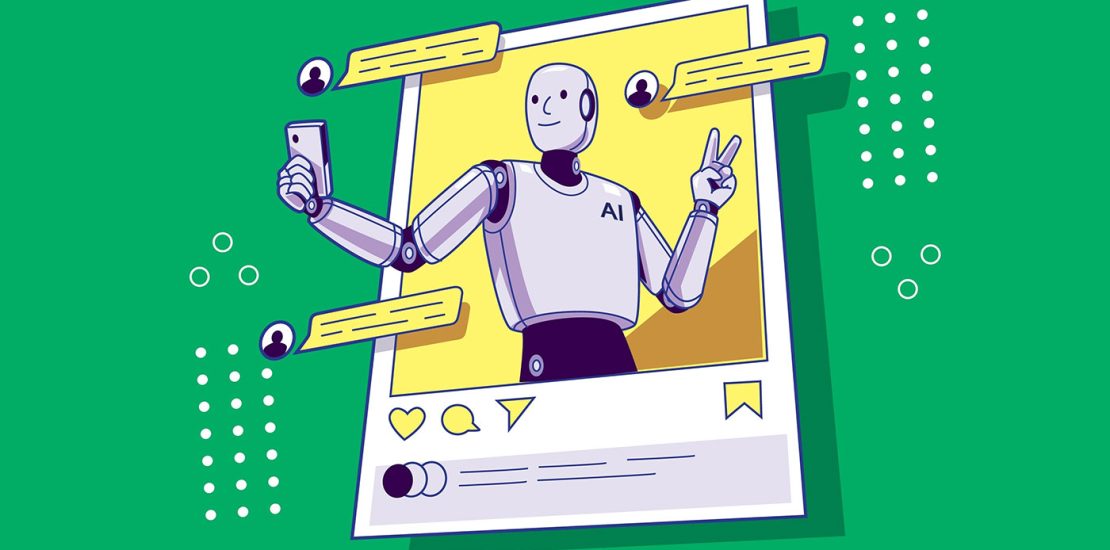How AI is Negatively Affecting Social Media
- September 25, 2025
- Author: Jordan Vansiclen
- Category: Social Media

Artificial Intelligence (AI) seems to be everywhere. It’s integrated into many of the products and services we use every day. From cars to household appliances to much more, AI is omnipresent. While there are some benefits to AI, such as automating tasks and assisting with planning and organizing, there is also cause for concern and caution, especially on social media.
On social media, AI-generated content can be used to create false propaganda, deceiving social media users and spreading misinformation. While some users can easily detect if something is AI-generated, a significant number of individuals can easily be swayed by this content. Technology has become so advanced that it can create a deep-fake of any celebrity, appearing to say anything the creator would like on any social platform. As a result, distinguishing between what is true and what is false is becoming more difficult. In fact, according to InspiritAI.com, “bots and fake accounts can be used to spread false information about political candidates or issues, potentially swaying public opinion and election outcomes.” This creates a serious challenge; once a person shares false information created by a bot, it can quickly spread across networks, impacting individuals, brands, and even government organizations. As of now, the only social platform that is taking some steps to flag this content is X/Twitter.
Even though X/Twitter provides some indication that a post contains false information, the moderation is run by other users, so mistakes are bound to happen, and fake posts will slip through the cracks. In order to stop the spread of misinformation, all social platforms need to implement warnings to let users know when the content they are viewing contains misinformation. With social media feeds being flooded with AI-generated content, having safeguards in place is a must.
AI is also hurting brands that are utilizing it. Authenticity continues to be one of the biggest trends on social media. Users want to see real people promoting products and services, not an AI-bot or AI-generated graphic that is purely pushing sales. Audiences also resonate more with genuine imperfections than with a brand that pretends everything is perfect. If your followers suspect AI-generated content, they tend to lose respect and trust for your company and may turn to a competitor for their needs.
Job displacement is another issue with AI in social media. Some brands are using AI for their social media posts because they think it’s easier and less expensive to use this technology than to hire someone to manage their profiles. These businesses have turned to AI to generate social media posts and eliminate the need for social media managers. Unfortunately, they may also be degrading their brand by not utilizing a skilled and strategic social media manager who understands brand voice, best practices, and can manage an issue or crisis. AI will never come across as authentic as having a human manage a social media account.
Influencers are also being negatively impacted by AI’s presence on various social media platforms. Since influencers’ main source of income is from companies that hire them to produce content to endorse and advertise products, their job security is threatened by the introduction of AI-generated influencers. According to a story on ABC News, these new non-human influencers are created by tech companies and are hired by large brands to share their message and market their products. The same article also mentions how influencers are hoping this flops, but the creators are adamant that these influencers are here to stay.
The final point we will focus on is addiction to social media, how it affects your mental health, and how AI is playing a role in this. Scrolling on social media has been an addiction since its inception. Now that AI has been introduced to social platforms, personalized content and AI-generated algorithms are serving content designed to keep users engaged for extended periods of time. This makes people even more attached to their phones, leading them to constantly check for fear of missing out on anything.
While there are some instances where artificial intelligence can be pretty helpful, it does more damage than good when it comes to social media. Since most social media platforms don’t have any reliable checks in place that alert users to AI-generated content, we need to approach what we see online with care and skepticism. If you come across questionable information on any social platform, please do your research before thinking it’s the truth. Have questions? Send me an email at jvansiclen@sacommunications.com.
